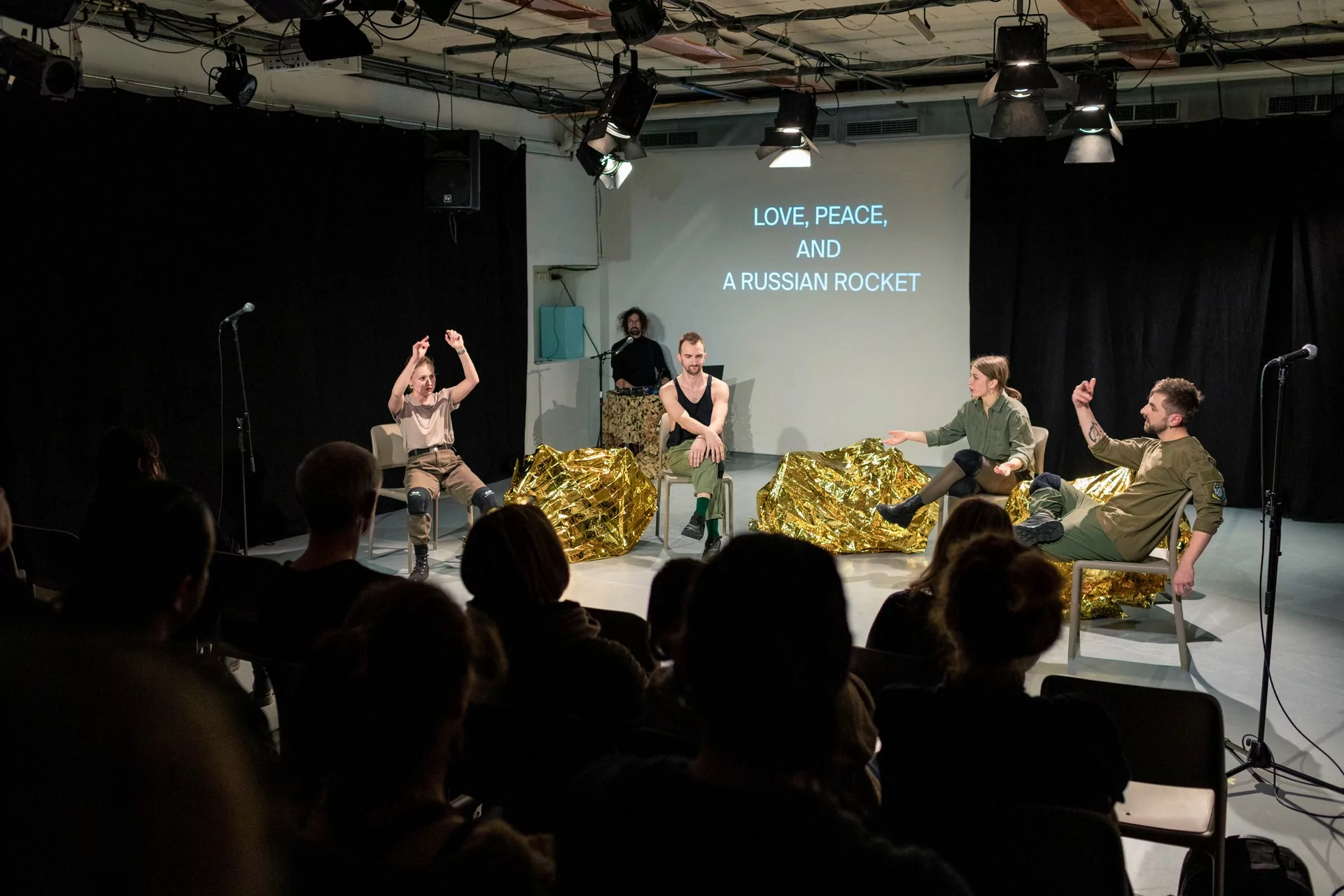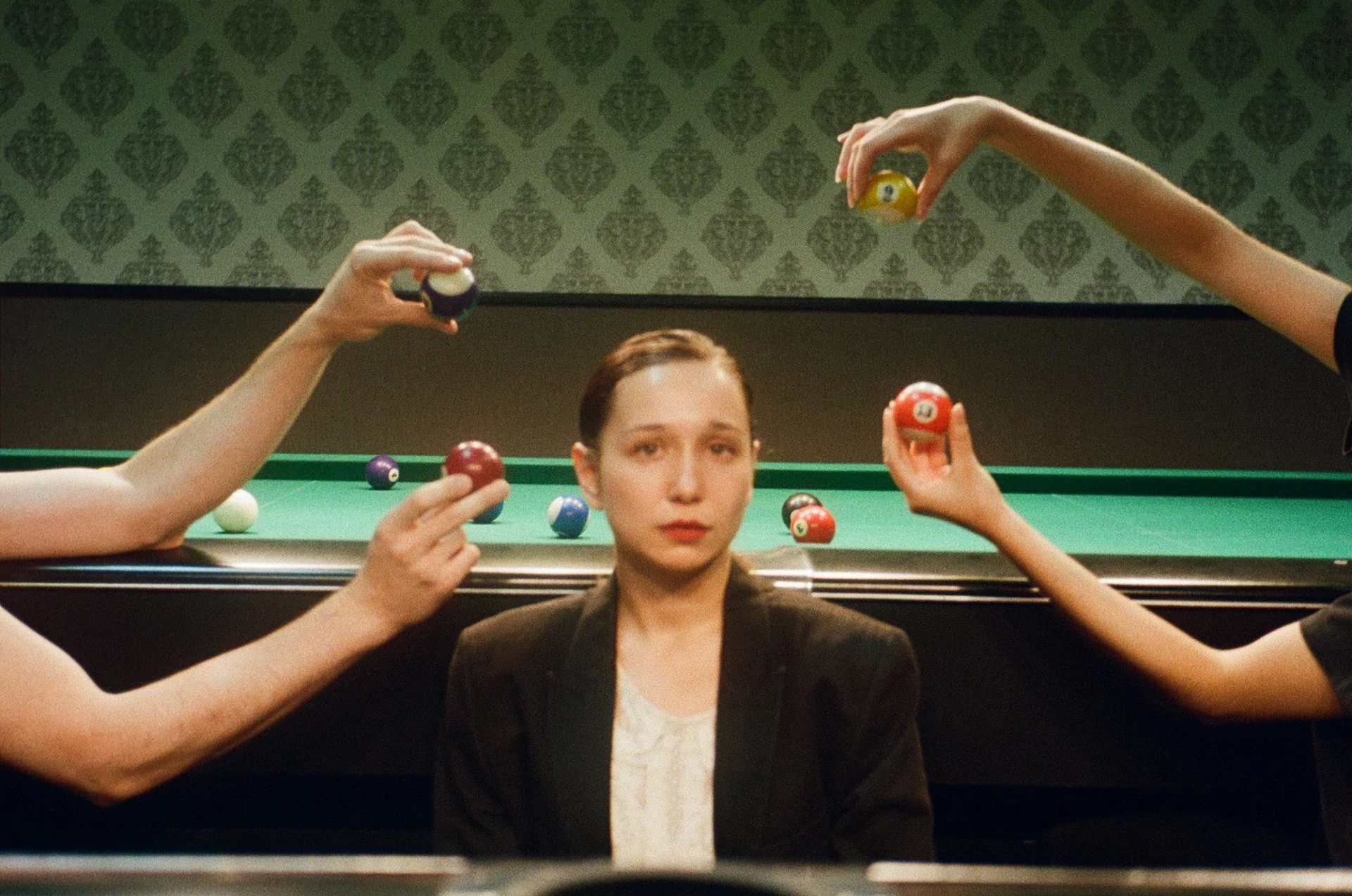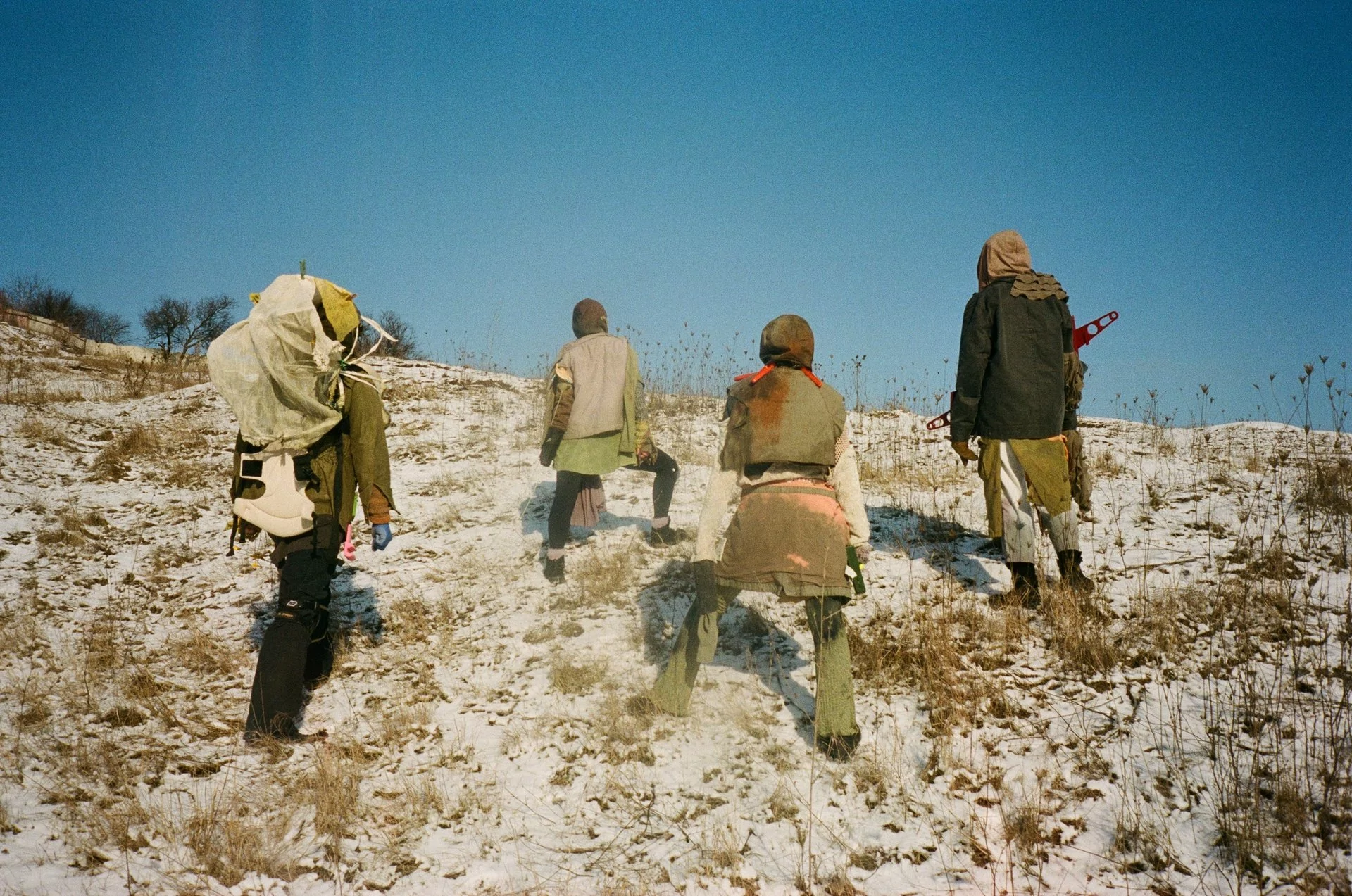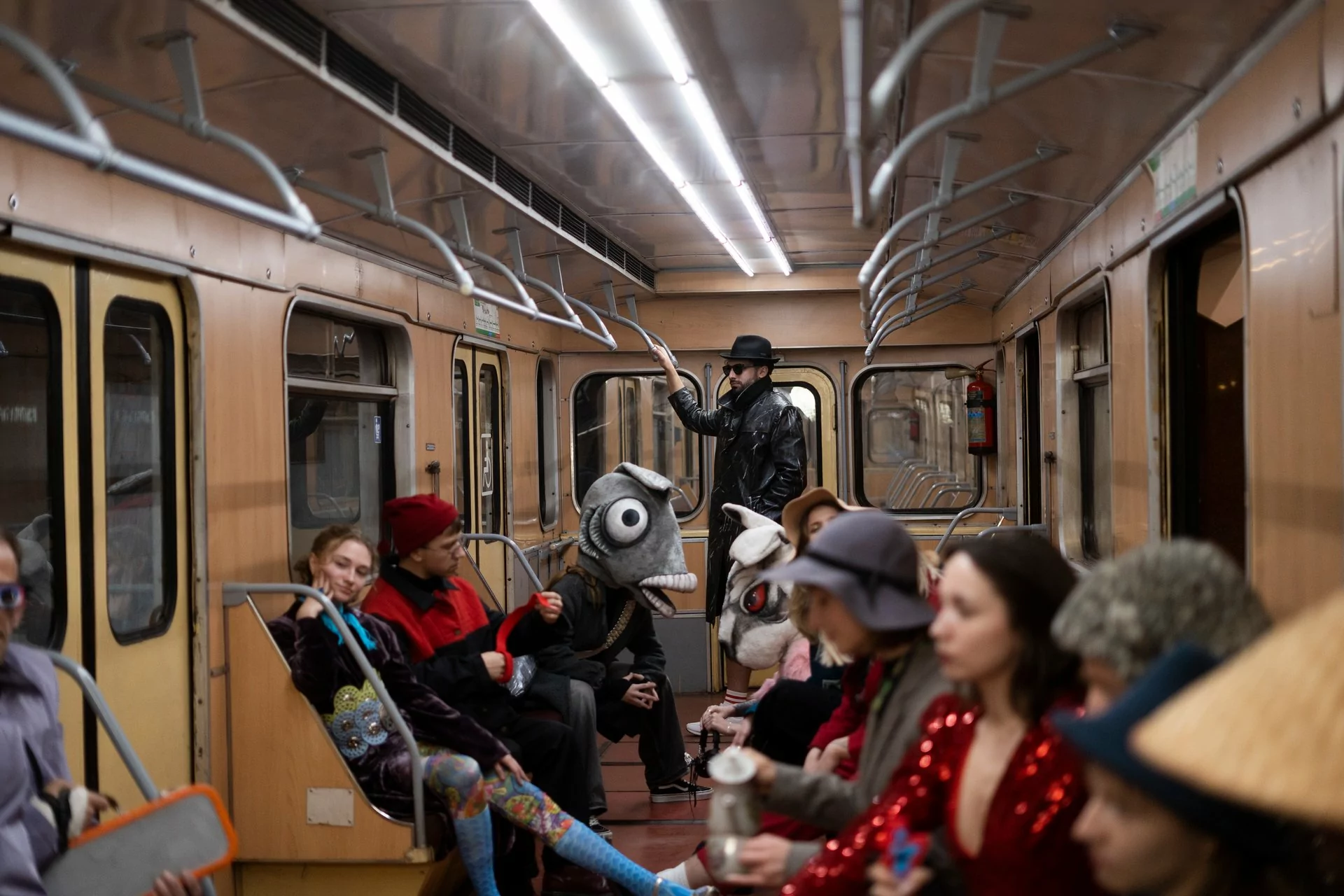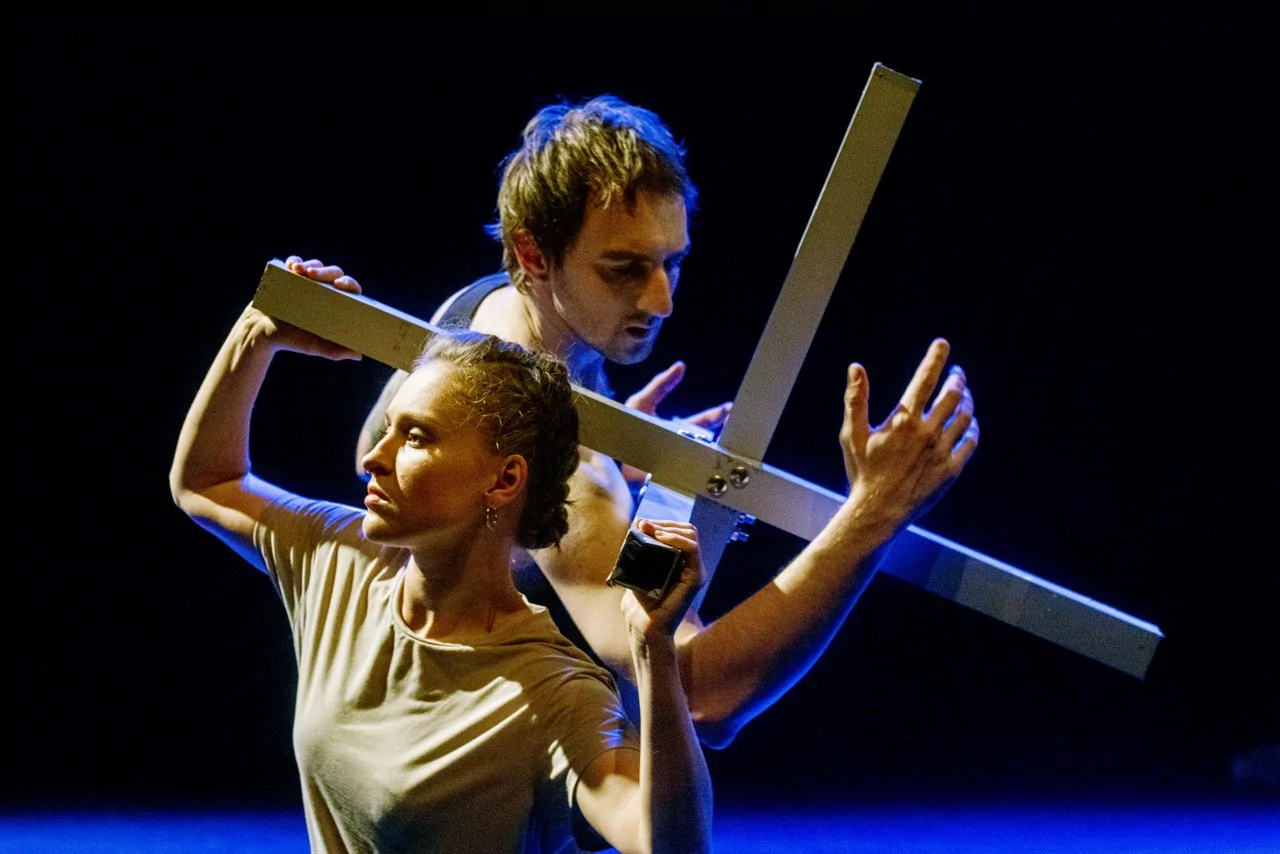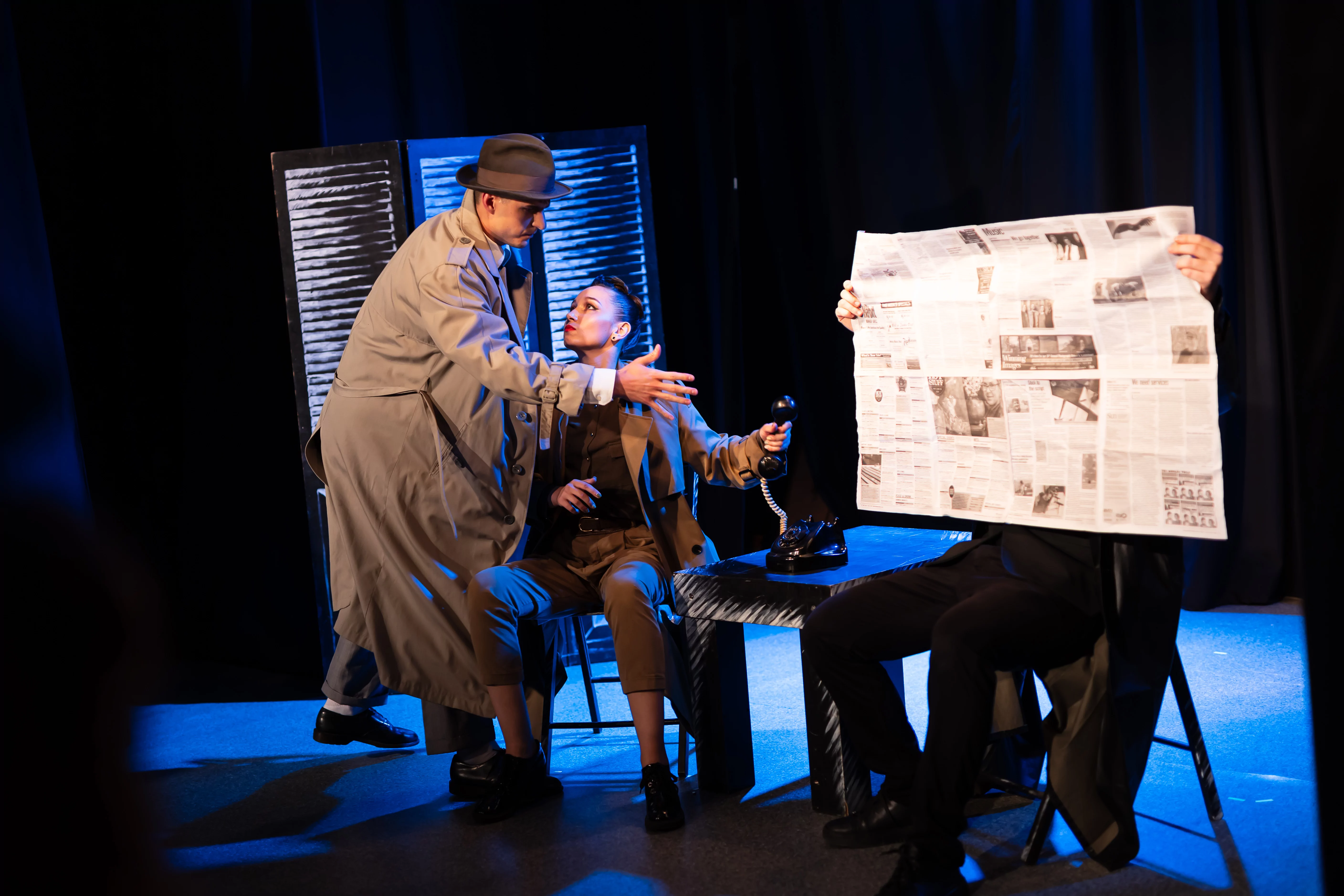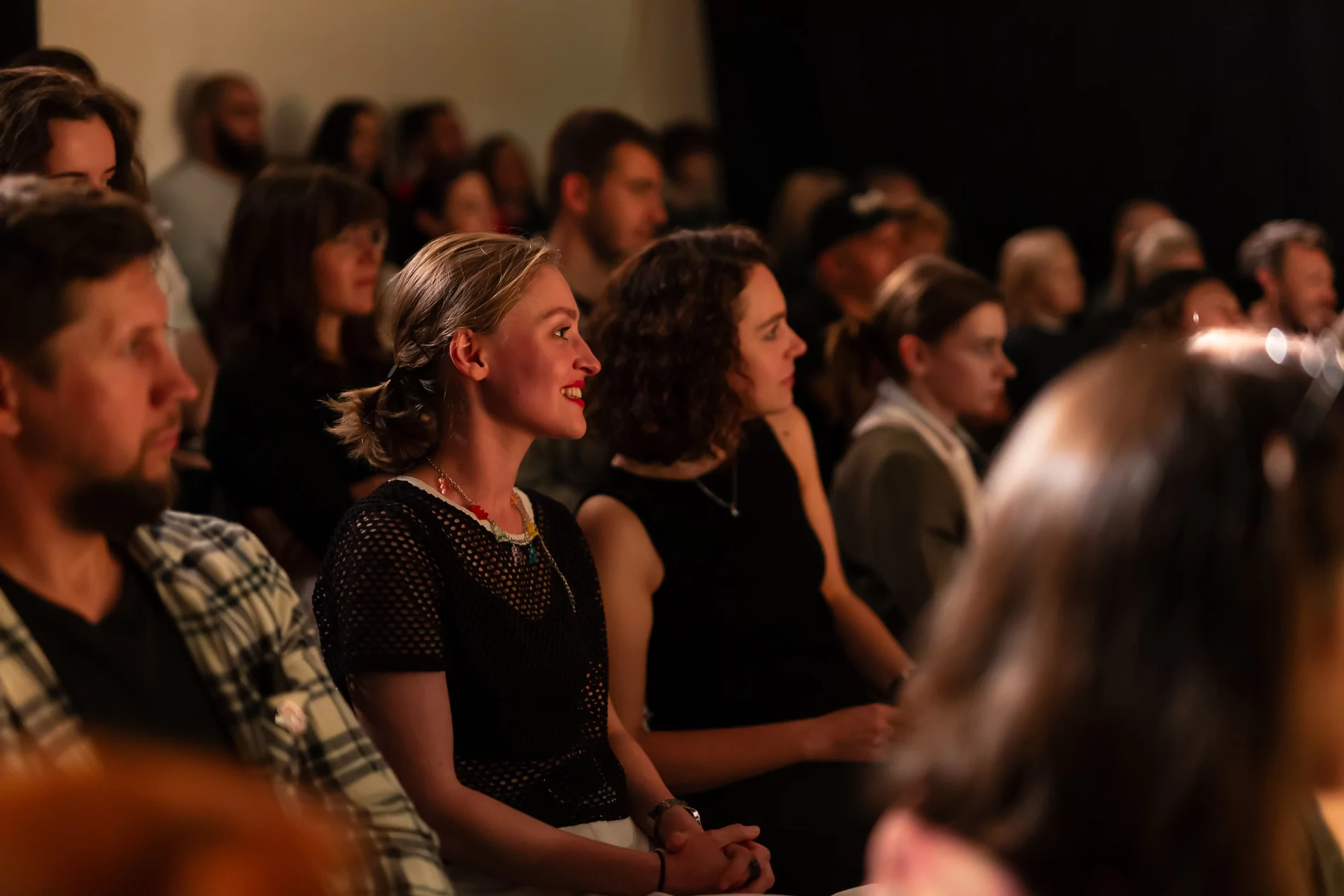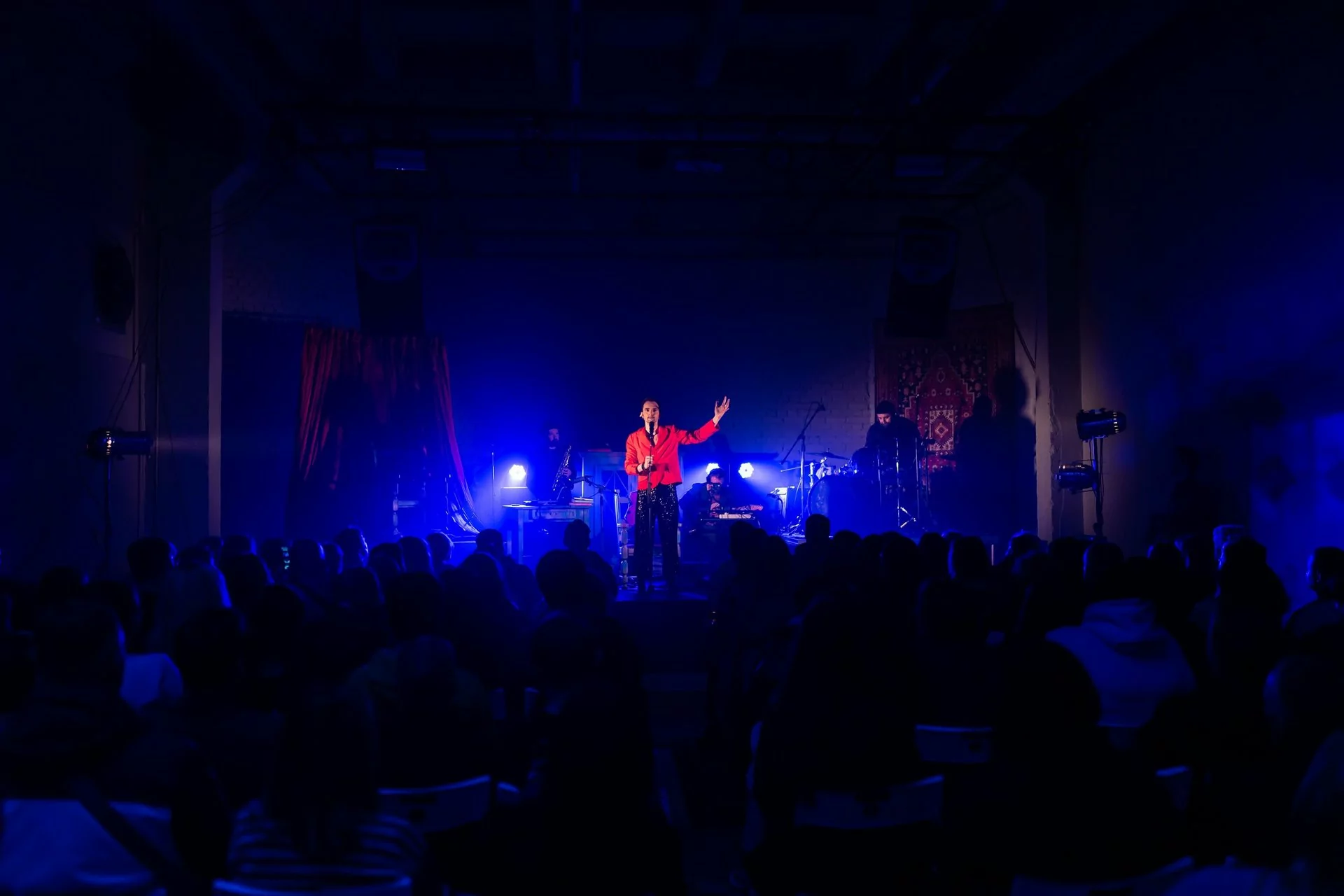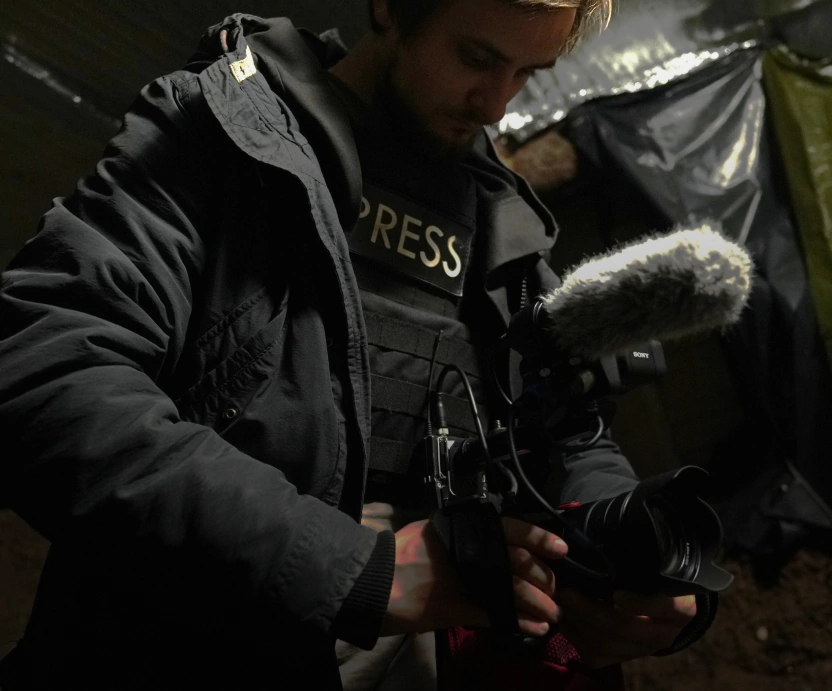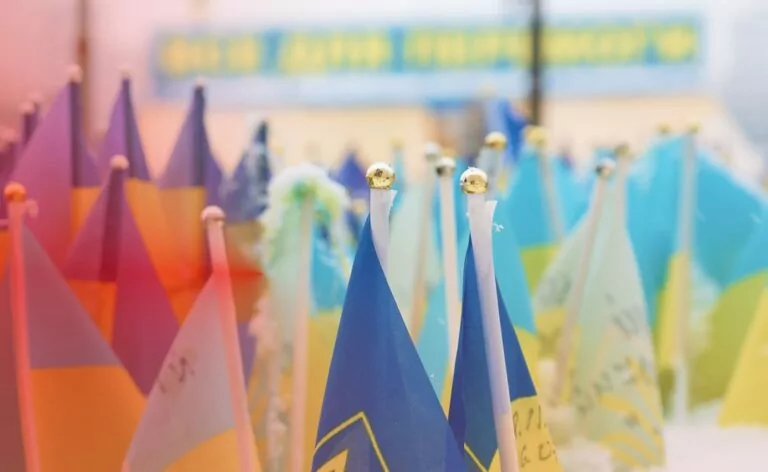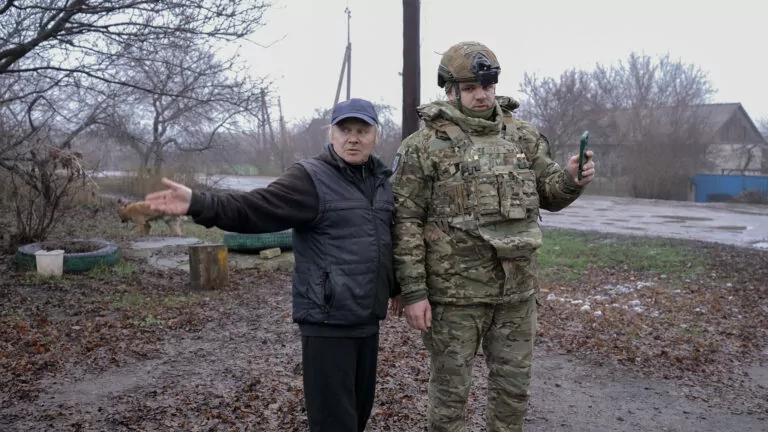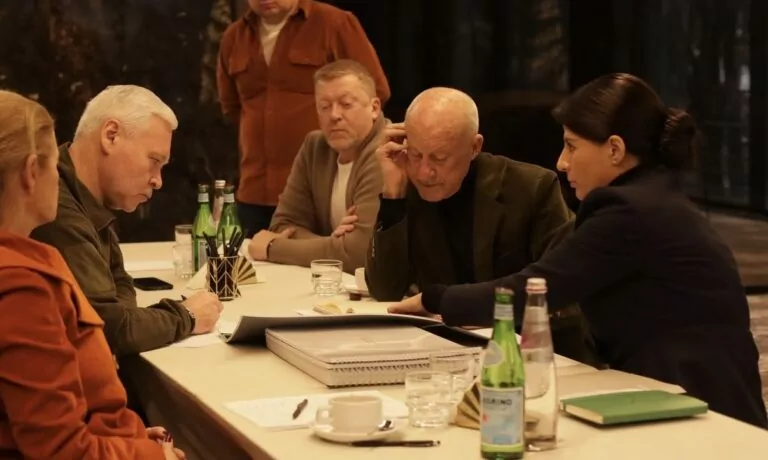Independent theater Nafta came back to Kharkiv to explore how war transforms not only cities but people — and discover how theater can embrace that transformation.
For seven years, Nafta Theater has navigated both creation and disruption. Founded as an independent, alternative space in Kharkiv, it was displaced by the Russian full-scale invasion. Then, in 2023, the ensemble reignited its presence in the city. As director and co-founder Nina Khyzhna recalls, “Life somewhere else was meaningless for me, so we reopened the theater—it was like a dream.”
By creating socially responsible performances, Nafta Theater puts value in freedom, human-centeredness, mutual respect, — and aims to inspire societal change. In their recent performance Khartede 20, the crew explores postcolonialism, centering on the Executed Renaissance. It was a generation of Ukrainian poets, writers, and artists from the 1920s. Many of them lived in Kharkiv, particularly in the building called “Slovo” (“Slovo” translates from Ukrainian to “word”) before being silenced, — executed or sent to forced labor camps — by the Soviet regime.
Khartede 20 not only revisits this erased chapter of Ukrainian cultural history but also poses a series of haunting questions: Does memory live in objects, trees, rivers, buildings? Can the presence of those who once walked these streets still be felt? Is reality shaped by the lives of people who were here — and, in some way, still are?
Kharkiv’s history deeply informed Khyzhna’s preparation for the performance:
“In this landscape near the Slovo building, I imagined what those poets and artists might have seen — how they went hunting farther from (the building), where the city used to end. I thought of how the landscape looked like for them, and what remained of it now. There have been no high-rise apartment buildings yet, but there was this rock, on which, most likely, Khvylovyi and Yohansen (one of the most influential writers of that time – ed.) would walk on. I can’t help but be inspired by that. We live among the same decorations. Nearby, there’s a military hospital, a little further is my home, and farther, there’s Khvylovyi’s grave. All of it coexists in a chimeric symbiosis, all of it forms our urban space,” Khyzhna reflects.
Nafta crew’s latest production, Cyborg Orgy, confronts the issue of ecocide. The performance reflects on the earth, humus, and the right to die on one’s land—right that’s both political and human.
The play draws a powerful connection between the destruction of nature and human suffering. When weapons tear through buildings, plants, animals, and humans, and when chemicals from rockets contaminate the soil and water, can one recognize the non-human, although living, victims of this violence? The ongoing, unpunished losses of countless creatures and ecosystems remain largely unseen. Uncertain of how to address it, Nafta’s crew takes to the stage to name the crimes, mourn the victims, and bear witness to the disaster unfolding before them (and the audience).
The large-scale environmental damage caused by Russia—such as the destruction of the Kakhovka Dam in 2023—represents a clear act of ecocide. Ukrainian Prosecutor General Andrii Kostin called it “a crime against Ukraine as a state and (against) our future.” By incorporating non-human agents into their war stories, Nafta is pushing the boundaries of post-war justice to incorporate all the living.
Healing and rebuilding after conflict must include both human and non-human lives, as well as the planet itself; that is what, in Nafta’s words, Cyborg Orgy is about.
Shedding light on social responsibility is deeply personal to Khyzhna: “I think the imperfection of this world inspired me. I started looking either for alternative worlds or how to improve this one using some other way of seeing. I did not feel safe in this reality, so I decided to create a safe space; theater became a place of escape and a place of arrival.”
When Nafta Theater was founded, many people were not ready for its alternative vision. Kharkiv’s theater scene was steeped in conventional traditions, shaped by a Soviet-era dramaturgical school that prioritized socialist realist narratives—idealized depictions of Soviet life that promoted values of communist state ideology. Nafta’s emerging collective of performers challenged that status quo.
In opposition to the system, the theater pursued experimental and provocative approaches and urged reevaluation of fundamental narratives—such as, for instance, how women should act and exist within the theatrical space. As a child shaped by sexist stereotypes, Khyzhna used to say that she doesn’t like female directing. As she grew, she started to look for other perspectives and ways to think about women’s behavior, body, and modalities of both being on stage and beyond it.
Khyzhna remembers how first performances were perceived: “In the performance Naїve, I took on the roles of both director and actress for the first time. I came back to Kharkiv from Poland in 2015, where I was working in the independent theater Brama. Driven by an extraordinary thirst for creation, I began posting announcements everywhere, inviting people to acting classes—that’s how I found my first crew.”
“I was looking for distinct actions that could affect reality through performance”
“Naїve was a performance dedicated to naïve idealism and marginalized segments of society—those who are pushed to the edges of their communities. I felt very frustrated when I realized that theater is a very ephemeral field. That was unfortunate. It was crucial for me to know that I can influence reality somehow. At one point, we contacted an animal rescue center, and started looking for new owners for animals during the performance itself. I remember well how, later, they sent me photos of the cats they adopted. I was looking for distinct actions that could affect reality through performance,” Nina Khyzhna says. “In some scenes, we simply sat in silence, looking the audience in the eyes—it was something new. Someone even cried during the performance, which was a striking thing for me — realizing that, through my expression, I could impact someone’s world, start an exchange of feelings. It felt like a door opening into creative subjectivity, into obtaining agency within my profession.”
In spring of 2023, Kharkiv administration introduced a controversial ban on mass events in theaters, concert halls, clubs, museums, libraries, and open spaces for gatherings exceeding 50 people. Citing relentless Russian shelling and a lack of shelters, authorities said the restriction will remain in place until the end of martial law. Active cultural communities found the restriction unbearable.
As Artem Vusyk, an actor from Nafta Theater, put it: “Obviously, I don’t support these restrictions. Kharkiv is a culturally significant city, and authorities should support its culture. Many theaters have adapted, finding spaces that meet State Emergency Service’s requirements. We’re lucky our partners, Some People [Center of New Culture — ed.], offered their certified venue.” That’s where independent initiatives outshine government-run ones, finding flexible ways to keep culture alive despite restrictions.
When Nafta returned to Kharkiv, their first performance defied expectations.
They staged Rat, an absurd comedy strikingly out of sync with the surrounding reality.
Khyzhna looks back at it with a smile: “There were people who said it was needed. One woman told me, ‘I had forgotten I could be that way—laugh in a theater, experience culture, enjoy things again.’ For some people, like one of my acquaintances whose husband served in the military, it was hard to watch. People are different, and their needs differ, too. We also opened a bar on the first floor, Rat’s Bar; it was like rebooting a life. Of course, life in a different form but still undeniably real.”
In Kharkiv, there’s no need for retreats in the mountains to learn the art of “living in the moment.” Nothing serves as a sharper lesson than a Russian missile.
“One hand torn apart while the other one is still filming”
Khyzhna recalls Kharkiv’s landscape as both challenging and inspiring: “Once in a dialogue with Serhii Zhadan (famous Kharkiv poet), he told me that Russians ironically call their aerial bombs ‘landscapers’ because it literally changes the scenery of the city. We often discuss this idea of blank spaces that missiles leave. What appears in these blank spaces? What do we fill them with? How do we look at them, both physically and metaphorically? I remember a colleague saying that artists in times of war are people who have one hand torn apart while the other one is still filming. A bright metaphor to answer the question of ‘how is it to create art amid war?’ You are part of the city. Your body becomes a part of it. I hope to become the very soil of this land.”
In such an environment, artists must be especially careful not to create an illusion of life, nor to deepen the hole of despair—it’s about finding the balance, Khyzhna says.
For Nafta Theater and Khyzhna, it is crucial not to turn away from wounds and pain, not to create taboos; death and severed limbs exist together with the oncoming spring and new life being born.
She reflects on that: “It is important for us to be in reality, to have balance between seeing life as it is and as an artistic code. Keep being alive and even playful. The very fact that people come together to live through such a cultural experience is an act of manifestation of life. When we are together, we create a feeling that we are not alone in this experience, in this grief; none of us are unique in a good sense of this word.”
Author: Matvii Suminov
Cover photo: “Nobody Died Today” play, 2022. / Source: Nafta Theater
Read more
- “Dali: I will get my life back.” Kharkiv remembers poet, soldier Maksym Kryvtsov 1 year after he was killed in combat mission in Russia’s war
- “Kharkiv is a printing capital.” Consequences of Russians destroying largest printing house in Kharkiv
